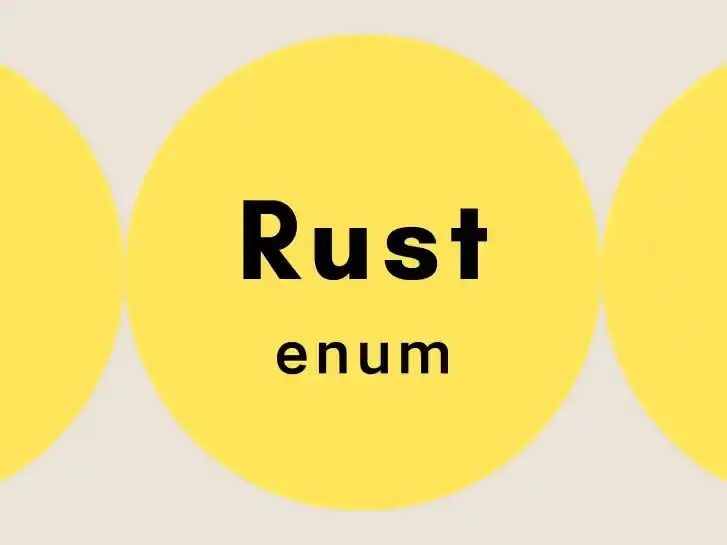Basic Concepts of Enums
An enumeration (enum) is a user-defined type that combines a set of possible values. Each possible value is called a variant. In Rust, each variant of an enum can carry different types of data. A simple enum definition generally looks like this:
enum Message { Quit, Move { x: i32, y: i32 }, Write(String), ChangeColor(i32, i32, i32),}In this example, Quit, Move, Write, and ChangeColor are all variants of the enum. Among them:
Quitis a variant without data.Moveis a structured variant containing two fieldsxandy, with the typei32.Writeis a variant with aStringdata.ChangeColoris a variant with threei32data.
Use Cases of Enums
Error Handling
Enums are very common in error handling. Rust's standard library defines the Result enum, which is used to indicate the success or failure of an operation:
enum Result<T, E> { Ok(T), Err(E),}Ok(T)indicates that the operation succeeded, and the return value isT.Err(E)indicates that the operation failed, and the return value is the error informationE. By using theResultenum, we can clearly express that the return value of a function may have two situations, and we can use pattern matching to handle these two situations.
fn divide(numerator: f64, denominator: f64) -> Result<f64, String> { if denominator == 0.0 { Err(String::from("Cannot divide by zero")) } else { Ok(numerator / denominator) }}fn main() { match divide(10.0, 2.0) { Ok(result) => println!("Result: {}", result), Err(err) => println!("Error: {}", err), }}State Machines
Enums are very suitable for implementing state machines. By defining an enum type, we can clearly represent the different states an object may be in and can transition between states.
enum State { Idle, Running, Stopped,}struct Machine { state: State,}impl Machine { fn new() -> Self { Self { state: State::Idle } } fn start(&mut self) { match self.state { State::Idle => self.state = State::Running, _ => println!("Cannot start from this state"), } } fn stop(&mut self) { match self.state { State::Running => self.state = State::Stopped, _ => println!("Cannot stop from this state"), } }}fn main() { let mut machine = Machine::new(); machine.start(); machine.stop();}Event-Driven Programming
In event-driven programming, enums can be used to represent different event types. Each event can carry different data, making it convenient for developers to handle events based on their types.
enum Event { Click { x: i32, y: i32 }, KeyPress(char), Resize { width: u32, height: u32 },}fn handle_event(event: Event) { match event { Event::Click { x, y } => println!("Clicked at ({}, {})", x, y), Event::KeyPress(c) => println!("Pressed key: {}", c), Event::Resize { width, height } => println!("Resized to {}x{}", width, height), }}fn main() { let events = vec![ Event::Click { x: 10, y: 20 }, Event::KeyPress('a'), Event::Resize { width: 800, height: 600 }, ]; for event in events { handle_event(event); }}Enums and Pattern Matching
Enums and pattern matching are one of the most powerful combinations in Rust. Pattern matching allows developers to branch based on the variants of an enum and can extract the data carried by the variants.
enum Coin { Penny, Nickel, Dime, Quarter,}fn value_in_cents(coin: Coin) -> u8 { match coin { Coin::Penny => 1, Coin::Nickel => 5, Coin::Dime => 10, Coin::Quarter => 25, }}fn main() { let coin = Coin::Dime; println!("Value: {} cents", value_in_cents(coin));}Extracting Data
Pattern matching can not only match the variants of an enum but also extract the data carried by the variants:
enum Message { Quit, Move { x: i32, y: i32 }, Write(String), ChangeColor(i32, i32, i32),}fn handle_message(message: Message) { match message { Message::Quit => println!("Quitting..."), Message::Move { x, y } => println!("Moving to ({}, {})", x, y), Message::Write(text) => println!("Writing: {}", text), Message::ChangeColor(r, g, b) => println!("Changing color to RGB({}, {}, {})", r, g, b), }}fn main() { let messages = vec![ Message::Quit, Message::Move { x: 10, y: 20 }, Message::Write(String::from("Hello, world!")), Message::ChangeColor(255, 0, 0), ]; for message in messages { handle_message(message); }}Advanced Features of Enums
Derivable Traits for Enums
Rust provides the derive attribute, which allows developers to automatically implement some standard library traits for enum types, such as Debug, Clone, Copy, etc.
#[derive(Debug, Clone, Copy)]enum Color { Red, Green, Blue,}fn main() { let color = Color::Red; println!("{:?}", color); let cloned_color = color.clone(); println!("{:?}", cloned_color);}Associated Methods for Enums
Associated methods can be defined for enum types through impl blocks, and these methods can be used to handle the logic of the enum.
enum IpAddr { V4(String), V6(String),}impl IpAddr { fn display(&self) { match self { IpAddr::V4(ip) => println!("IPv4: {}", ip), IpAddr::V6(ip) => println!("IPv6: {}", ip), } }}fn main() { let ip_v4 = IpAddr::V4(String::from("192.168.1.1")); let ip_v6 = IpAddr::V6(String::from("::1")); ip_v4.display(); ip_v6.display();}Recursive Definition of Enums
Enums can be recursively defined, which is very useful when implementing recursive data structures (such as linked lists or trees).
enum List { Cons(i32, Box<List>), Nil,}fn main() { let list = List::Cons(1, Box::new(List::Cons(2, Box::new(List::Cons(3, Box::new(List::Nil))))));}Summary
Enums are a very powerful feature of Rust's type system. They not only provide type-safe polymorphism but also combine perfectly with pattern matching, making the code clearer and easier to maintain. With enums, developers can easily implement error handling, state machines, event-driven programming, and other features, while also using Rust's type system to ensure the correctness of the code.
